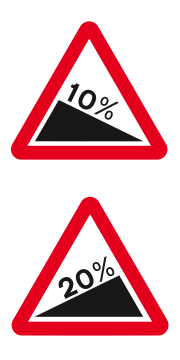Concerning parking your car on hills and slopes, Driving: The Essential Skills (TES) says:
If you park your vehicle on a slope, remember the following.
Parking facing uphill –
- Stop your vehicle as close as you can to the nearside kerb, if there is one.
- Leave your steering wheel turned to the right. If the vehicle rolls backwards, the front wheels will be stopped by the kerb.
- If there is no kerb, leave your steering wheel turned to the left. If the vehicle rolls back it won’t roll across the road.
- Leave the vehicle in first gear with the parking brake firmly applied.
Parking facing downhill –
- Leave your steering wheel turned to the left. The kerb should stop any forward movement.
- Leave your vehicle in reverse gear with the parking brake firmly applied.
The logic behind this is simple. Facing uphill with a kerb, the front wheels will chock against it before the car picks up enough speed to mount it, and the car will stop. If you point your wheels to the left, the car will first of all roll away from the kerb in an arc and also pick up speed – so it will roll first of all into traffic, and possibly pick up sufficient velocity to mount the pavement or travel far enough back to hit someone or something.
Obviously, if there is no kerb, the lesser of two evils is to have it roll into the verge and not into oncoming traffic, hence the reason for pointing your wheels to the left in that case.
And you leave it in the gear which is the opposite to the direction the car will roll – in this case first, as it will roll backwards if there is a problem with the handbrake.
When facing downhill, you point your wheels to the left so that the kerb will again act as a chock. There is no need for a separate clause for when there is no kerb because you will want the car to roll the same way, away from traffic.
And in this case, you leave it in reverse, since the car will want to roll forwards if the handbrake fails.
I can see no reason to go against this advice.
